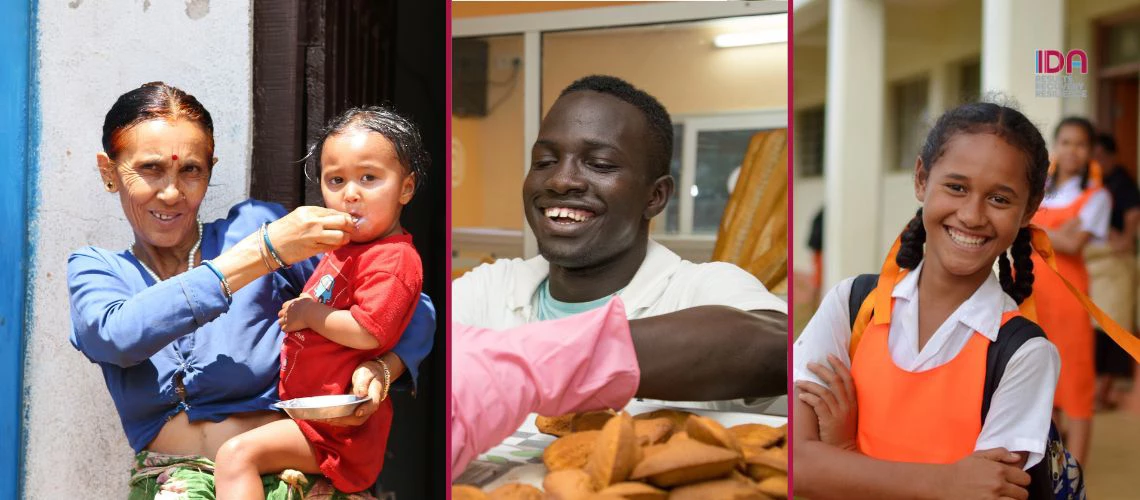 The World Bank’s International Development Association (IDA) launched its 20th cycle at a high-level global event in Tokyo this week--following a historic replenishment to help the most vulnerable countries pursue durable recovery from overlapping crises.
The World Bank’s International Development Association (IDA) launched its 20th cycle at a high-level global event in Tokyo this week--following a historic replenishment to help the most vulnerable countries pursue durable recovery from overlapping crises.
Our world is beset by overlapping crises—conflict, COVID-19, food insecurity, climate change, rising debt—all of which have been shown to hit the poorest people disproportionately harder. Be it through rising food prices, inequitable access to health services or higher exposure to climate hotspots, the most vulnerable people are being made even more vulnerable.
The World Bank’s International Development Association—its fund established in 1960 to support the 74 poorest countries—just launched its 20th cycle (known as IDA20) at a high-level global event in Tokyo, Japan. Following a historic replenishment of $93 billion, including contributions from 52 high- and middle-income countries, IDA20 is well-suited to help countries address such compound challenges. And at a time when global solidarity has become critical to solving concurrent crises, IDA is a prime example of such commitment to support countries pursue durable recovery.
IDA has a long track-record of helping countries through crises like Ebola, earthquakes, floods and droughts. But this early IDA20 cycle, born out of unprecedented need and triggered by the COVID-19 pandemic, is special. It was specifically designed to tackle crises. Its overarching theme speaks for itself – Building Back Better from the Crisis: Towards a Green, Resilient, and Inclusive Future. So here are five ways in which IDA20 is fundamentally geared to help countries facing the challenges of today develop and deliver effective, time-tested solutions.
1. People bear the brunt of crises; people are at the heart of IDA20.
The twentieth replenishment framework is underpinned by a prioritization of human capital investments—investments in people, their health, their education—which feed into a country’s overall economic health and resilience. IDA20 is inclusive and intentional about leaving no one behind: women, children, people with disabilities, and people living in areas affected by fragility and conflict.
2. IDA20 has a robust focus on crisis preparedness, with an emphasis on strengthening pandemic preparedness and food systems resilience to help countries weather emergencies.
Through this package, IDA will deepen support to countries and their systems to better prepare for and respond to future crises--including pandemics, financial shocks, and natural hazards. IDA20 will also invest in stronger and more resilient food systems by supporting agriculture and helping families cushion the effects of higher food prices.
3. IDA20 has enhanced ambitions on fighting the chronic crisis of climate change and mitigating its impact on the poorest people.
IDA20 will prioritize tackling climate change, including by aligning operations with the Paris Agreement. By increasing climate co-benefits, and with high targets for green financing and ecosystem services, it will help countries to adapt to rising climate impacts and preserve biodiversity.
4. To support especially vulnerable groups, IDA20 has special provisions through which countries can access additional resources.
For example, the Window for Host Communities and Refugees helps eligible host countries create meaningful longer-term development opportunities for refugees and host populations. Similarly, the Fragility, Conflict and Violence (FCV) Envelope provides financing to countries facing acute FCV risks.
5. Recognizing that crises worsen debt vulnerabilities, IDA20 has a strong handle and proactive plan on sustainable debt management.
The Sustainable Development Finance Policy drives the plan. The policy aims to incentivize countries to move toward transparent and sustainable financing, and to further enhance coordination between IDA and other creditors in support of the countries’ reform efforts. The policy helps address debt management, fiscal sustainability, and debt transparency challenges systematically and proactively over a medium- to long-term horizon.
Equipped with this highly tailored package, IDA will finance projects designed to deepen support to responding to various crises and drive resilient recovery for the poorest countries, between July 1, 2022, and June 30, 2025.
IDA stands ready to partner with countries as they rebuild their economies and improve livelihoods, while maintaining a sharp focus on long-term development goals. You can follow IDA’s journey of results and impact in the months ahead, using the hashtag #IDAworks.


Join the Conversation